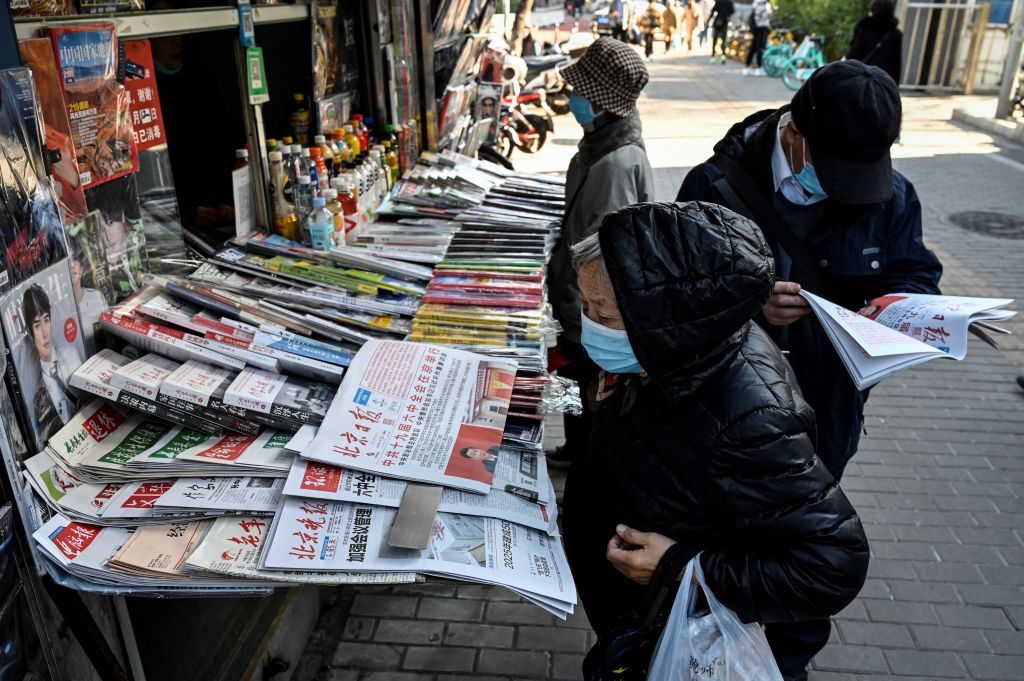Press freedom advocates report 2021 was another dismal year for journalism around the world. Few of those advocates have examined how the antics of politically biased American corporate media are hurting their cause.
Annual press freedom reports, like the one released by Reporters Without Borders (RSF) in December, focus on metrics like journalists imprisoned by governments, kidnapped by insurgents, or killed. They look at newspapers and websites shuttered by oppressive regimes in places like Belarus and Hong Kong and tally up the number of stories deleted by tyrants.
By all of those measures, press freedom around the world has been diminishing for at least the past decade, and 2021 was another bad year. RSF counted the highest number of journalists imprisoned since it began publishing its annual press freedom report in 1995. 488 journalists and media workers were jailed as of December 2021, a 20-percent increase over 2020.
RSF noted a pronounced increase in the number of female journalists suffering arbitrary detention – 60 in all, a 33-percent increase over last year.
Much of the surge in both male and female journalist imprisonment came from three sources: the military coup in Myanmar, dictator Alexander Lukashenko’s fierce effort to retain power in Belarus, and above all Communist China’s massive crackdown on freedom in all of its possessions, especially the formerly autonomous island of Hong Kong.
China, the world’s biggest jailer of journalists for five years in a row, was pitiless in slapping heavy prison sentences on women and the elderly. The oldest journalist jailed by a repressive regime in 2021 was Hong Kong’s 74-year-old Jimmy Lai, whose Apple Daily pro-democracy newspaper was ruthlessly destroyed by the Chinese Communist Party and its Hong Kong stooges. Nineteen of the female journalists in RSF’s 2021 tally were imprisoned by China, three of them in Hong Kong.
Chinese state media compares the crackdown on Hong Kong's pro-democracy Apple Daily to Big Tech killing the Parler social media platform. https://t.co/G2poKPp7t3
— Breitbart News (@BreitbartNews) June 28, 2021
Belarus had the dubious distinction of detaining more women than men in 2021, a quirk RSF attributed to the “patriarchal tolerance traditionally displayed by Belarusian authorities” and the “leading role of women at the onset of post-election protests.” Lukashenko’s ugly regime threw two women reporters in prison merely for live-streaming a protest rally.
Many of the imprisoned journalists mentioned in RSF’s report were in visibly poor health when they appeared in court, or were last seen by family and friends. Some were sentenced to over a decade of confinement. The clear implication in many of these cases is that the regimes expect these dissident reporters to die in prison.
RSF Secretary-General Christophe Deloire said the suppression of journalism in 2021 by these three “dictatorial regimes” was “a reflection of the reinforcement of dictatorial power worldwide, an accumulation of crises, and the lack of any scruples on the part of these regimes.”
“It may also be the result of new geopolitical power relationships in which authoritarian regimes are not being subjected to enough pressure to curb their crackdowns,” Deloire suggested.
The relatively good news was that fewer journalists were killed in 2021, largely because some previously deadly conflicts were winding down. Afghanistan was an unsurprisingly dangerous venue for reporters, but it ran neck-and-neck with Mexico, where “journalists who cover sensitive political stories or organized crime, especially at the local level, run a high risk of being gunned down in cold blood.”
The Committee to Protect Journalists (CPJ) produced a comparably depressing account of press freedom in 2021, counting a record high number of journalists in prison. Using a different methodology than RSF, CPJ said the top three jailers of reporters were China, Myanmar, and Egypt.
CPJ sounded a special alarm about Communist China’s “all-out assault” on Hong Kong media, noting that the final days of 2021 saw a flurry of new charges filed against Jimmy Lai and other Apple Daily executives, while an outrageous police raid shut down another dissident publication, Stand News.
“Hong Kong’s once-vibrant media scene is being crushed as China exerts greater control over the former colony, and the people of Hong Kong are deprived essential critical voices,” said CPJ Asia program coordinator Steven Butler.

A woman buys a Chinese newspaper covering the Communist Party’s sixth plenum meeting at a news stand in Beijing on November 12, 2021. (JADE GAO/AFP via Getty Images)

A newspaper cover with Casting Your Vote For Hong Kong – Our Home is seen on the ground during a rally in support of the new electoral system Legislative Council election on December 16, 2021 in Hong Kong, China. (Anthony Kwan/Getty Images)
“The landscape in which journalists operate around the world has never been more perilous,” retiring CPJ executive director Joel Simon declared over Christmas weekend.
Simon said the battle for press freedom is “a battle for the soul of democracy, a battle over who controls information.”
Unfortunately, press freedom advocates do not often take account of how corporate media organizations in the Western world are damaging press freedom with their blatant biases, their tendency to uncritically repeat disinformation that helps their preferred political party, and most disturbingly their eagerness to suppress politically damaging stories and shut down alternative media sources.
Simon was surely correct that the battle to control information is a fight for “the soul of democracy.” False choices are not free choices. Uninformed or misinformed voters cannot exercise their freedoms fully, just as swindled customers led astray by fraudulent sales pitches are not engaged in free commerce.
Freedom requires information, but it also demands dissent, a competition of opposing viewpoints. The coronavirus pandemic was an excuse for the sort of iron-fisted crackdown on journalists by crude authoritarian regimes charted by RSF and CPJ, but it also provided an excuse for outrageous crackdowns on free expression in the Western world.
Social media is unquestionably part of The Media now – it has become the source for a remarkable amount of legacy media content, as newspapers and TV shows routinely whip up stories based on a few tweets or Facebook posts – and social media became infamous over the past two years for banning posts that challenged the government or political party “consensus” on vaccines and Chinese coronavirus transmission.
In the last week of 2021, Twitter actually banned the inventor of mRNA technology, Dr. Robert Malone, for expressing skepticism about the use of mRNA vaccines. The social media giant did not even bother to specify what Malone said that it found objectionable. Mainstream media outlets did not seem particularly outraged by the Malone ban, or even curious.
The Establishment Media has suddenly begun questioning the origins of the Coronavirus and if Donald Trump was ultimately correct. https://t.co/lGSKw9PkYK
— Breitbart News (@BreitbartNews) May 27, 2021
The outlook of U.S. corporate media outlets became difficult to distinguish from that of state media operations in China or Russia after a president from the media’s favored Democrat Party entered the White House. A staggering number of important stories were under-reported or blacked out by the press in 2021 because they were politically damaging to President Joe Biden and his administration.
The blackout was especially striking with respect to the crisis on America’s southern border – a gigantic scandal with serious implications for crime, the economy, and the nominal Number One concern of the entire world, the coronavirus pandemic, and yet it received near-zero coverage or analysis in the mainstream media.
The media ignored and downplayed rising inflation under President Biden for an absurdly long time, while Americans reeled in shock from the hit to their wallets. The press even tried pretending inflation was good for working people, and then scratched its head in befuddlement when the public gave Biden rock-bottom approval ratings on the economy.
The same press corps that files hysterical stories about people failing to wear masks was utterly uninterested in a vast army of unvaccinated, undocumented people marching across the border into American cities, and had no questions for the Biden administration about why this migration was not only allowed, but encouraged. The press didn’t even care when the administration used it to spread a piece of pure, North Korea-style disinformation: Biden’s false allegation that Border Patrol agents were using horsewhips on migrants.
2021 began with the press censoring devastating revelations about President Biden’s son Hunter and ended with the bizarre lack of media interest in the background or motivation of Waukesha, Wisconsin, mass murderer Darrell Brooks, who drove his SUV into a Christmas parade and killed six people.
This was quite a contrast with the media’s obsessive, and often false, coverage of another Wisconsinite, self-defense shooting defendant Kyle Rittenhouse. Top media organizations may yet find themselves in court for gleefully spreading disinformation about Rittenhouse, much as NBC Universal and NBC were sued by a previous subject of media Two Minutes of Hate, high school student Nicholas Sandmann. In December, NBC reached a settlement in Sandmann’s $275 million defamation suit.
2021 was the year when American media’s deeply unhealthy love affair with the hideous governor of New York, Andrew Cuomo, came to a fiery end – and the media had to answer some very uncomfortable questions about why it gave employment and credibility to his equally toxic brother, Chris Cuomo.
The year also saw the full exposure and demolition of one of the worst media hoaxes in history, the “Russia Collusion” smear of former President Donald Trump. It is simply astounding how many major media outlets ran with incredibly flimsy Russia Collusion disinformation, given to them by known political operatives, their every journalistic instinct disabled.
Google has removed social media platform Parler from its Play Store for Android devices, stating the app will remain suspended until it implements "robust" moderation policies that crack down on free speech. https://t.co/8oe4iMe85I
— Breitbart News (@BreitbartNews) January 10, 2021
The Russia Collusion hoax is especially important because it became a feedback loop between media and government – the coverage was invoked to justify government actions taken against the Trump campaign, which in turn were cited by journalists as a reason to keep the story going. Advocacy groups should think long and hard about what that sort of feedback loop portends for press freedom in the future, and how much the American press has come to resemble the state media organs of the authoritarian regimes groups like RSF and CPJ rightly despise.
2021 saw increasing support from credentialed media organizations and reporters for free speech restrictions against everyone but themselves, a trend christened “the Journalists Against Free Speech” movement by critical observers.
Dishonest “fact-checking” operations are increasingly weaponized against dissident media – and those weapons are firing live rounds, because biased and proven-liar fact-checking operations are cited by Big Tech corporations to justify their censorship decisions. Facing a defamation lawsuit from video journalist John Stossel, Facebook admitted in court in December that its “fact checks” are merely statements of opinion. Partisan opinion pieces disguised as “fact checks” are more than just an annoyance when they become radioactive fuel for censorship machines.
Much of this enthusiasm for censorship from journalists was justified as a war against disinformation during the pandemic crisis – but every totalitarian regime, including world-heavyweight censors like Communist China, justifies its speech controls and state-run media outlets as measures necessary to control “disinformation.”
Too many American reporters and editorialists view free speech as an exclusive privilege of their guild. They overlook, or actively support, the contraction of press freedom for outsiders and upstarts. The guild certainly seems to think it should have a monopoly on undercover journalism, for example, as the crew at Project Veritas can attest.
This is a threat to worldwide press freedom as serious as any posed by dictators throwing reporters in jail for writing pieces they don’t like. It is a more immediate threat for Americans than brute repression. In 2021, it became increasingly clear that the worst threats to American journalism come from journalists.

COMMENTS
Please let us know if you're having issues with commenting.